PREVIOUS
LGBT Rights in Tamil Nadu – Part 1
November 26 , 2023
820 days
14817
0
(இதன் தமிழ் வடிவத்திற்கு இங்கே சொடுக்கவும்)
LGBT rights in Tamil Nadu
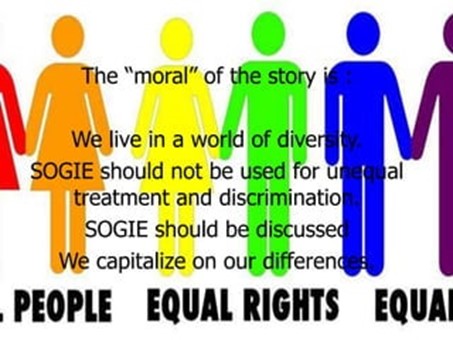
- Lesbian, gay, bisexual and transgender (LGBT) rights in Tamil Nadu are the most progressive among all states of India.
- Tamil Nadu was the first state in India to introduce a transgender welfare policy in 2008.
- Wherein transgender individuals can access free gender affirmation surgery in government hospitals and various other benefits and rights.
- The state was also the first to ban forced sex-selective surgeries on intersex infants.
- It is also the first state to include an amendment in its state police guidelines that expects officers to abstain from harassing the LGBTQIA+ community and its members.
- The state also became the first to ban conversion therapy as well as the first to introduce LGBTQIA+ issues in school curricula.
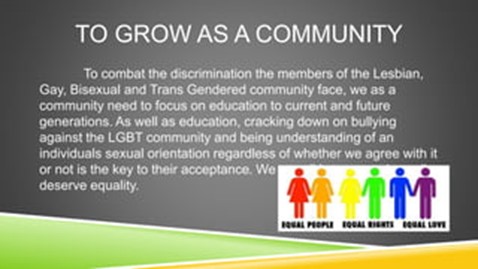
- Same-sex sexual activity has been legal since 2018, following the Supreme Court ruling in Navtej Singh Johar v. Union of India.
- Tamil Nadu is noted as one of the most open states with regards to the LGBT community, particularly transgender people.
- Nevertheless, reports of discrimination, arranged opposite-sex marriages, bullying, suicides and family rejections are common.
- According to an estimate from 2015, about 16,380 people in Tamil Nadu identified themselves as LGBT.
- On 22 April 2019, the Madras High Court, the high court of Tamil Nadu, ruled that the term "bride" under the Hindu Marriage Act, 1955 includes trans women.
- Specifically, it directed the authorities to register a marriage between a man and a transgender woman.
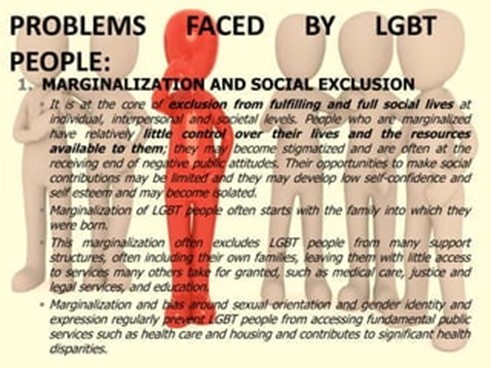
Transgender rights
- Transgender people in Tamil Nadu are called thirunar (Tamil: திருனர்), specifically thirunangai (திருநங்கை; for transgender women) and thirunambi (திருநம்பி; for transgender men).
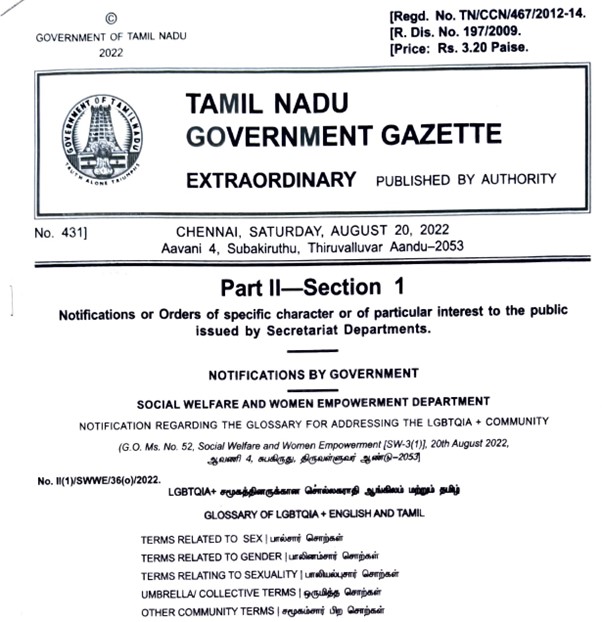
- It was given by the former chief minister Karunanidhi.
- The term aravaani (அரவாணி) in Tamil was widely popularized before the 1990s.
- Aravaani is a substitute term for hijra.
- Transgender Tamils are often discriminated against in jobs and daily life, forcing them to resort to begging and prostitution.
- In 1994, T.N. Seshan, the Chief Election Commissioner, granted voting rights to transgender people in India.
- In March 2004, advocate G.R Swaminathan appeared before the Madras High Court demanding voter identity cards for transgender people in Tamil Nadu.
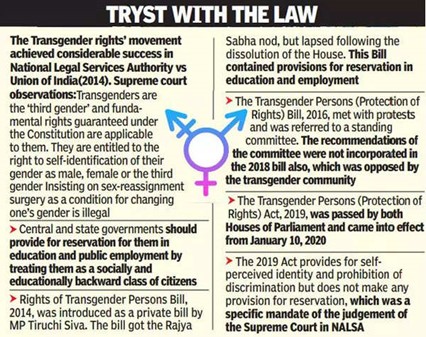
- Responding to the case, the All-India Anna Dravida Munnetra Kazhagam (AIADMK) Government informed the court that only 11 transgender people in the state had come forward to register their names in the electoral roll.
- After recording the submission, the court directed the State Government to publicize, through the media, the right of transgender people to get enrolled as voters.
- In December 2006, a government order was passed with the recommendations to improve living conditions for transgender people.
- The order favored counseling as a means to deter families from disowning transgender people and making sure that such children get admitted in schools and colleges.
- Thereafter, in 15th April 2008, the state constituted a welfare board for transgender people.
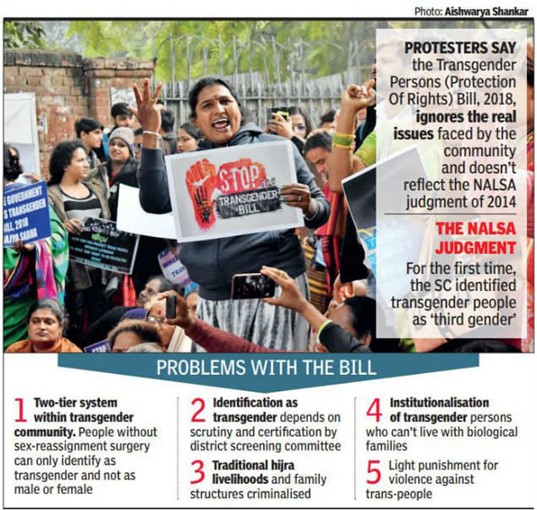
- This effort is touted to be the first in India.
- April 15 is observed transgender welfare day in Tamilnadu.
- The Social Welfare Minister serves as the president of the board.
- The State Government has also started issuing separate food ration cards for transgender people, as well as special identity cards.
- The state of Tamil Nadu was the first state to introduce a transgender welfare policy in 2008.
- According to the policy, transgender people can access free sex reassignment surgery in government hospitals, free housing, various citizenship documents, admission in government colleges with a full scholarship for higher studies and initiating income-generation programmes (IGP).
- In an additional effort to improve the education of transgender people, Tamil Nadu authorities issued an order in May 2008 to create a "third gender" option for admissions to government colleges.
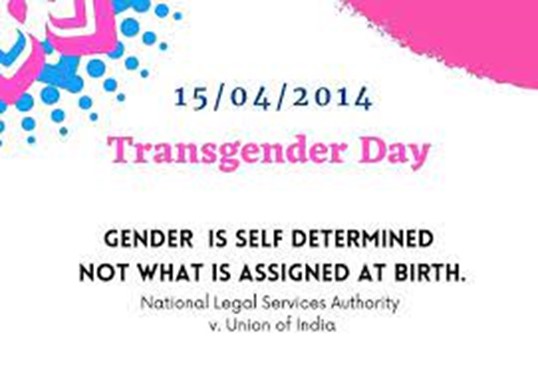
- In 2017, the Manonmaniam Sundaranar University began offering free tuition to transgender students.
- Transgender and gender activists S. Swapna and Gopi Shankar Madurai from Srishti Madurai staged a protest in the Madurai collectorate on 7 October 2013 demanding reservation and to permit alternate genders to appear for examinations conducted by the Tamil Nadu Public Service Commission, the Union Public Service Commission, the Secondary School Certificate and Bank exams.
- Swapna, incidentally, had successfully moved the Madras High Court in 2013 seeking permission to write the TNPSC Group II exam as a female candidate.
- Swapna is the first transgender person to clear TNPSC Group IV exams.
- Along with 21 other trans women, K. Prithika Yashini received appointment orders from Chennai City Police Commissioner Smith Saran in April 2017.
- Pursuant to a judgement of the Madras High Court on 6 November 2015, directions were given to the Tamil Nadu Uniformed Services Recruitment Board (TNUSRB) to appoint Yashini as a sub-inspector of police as she is "entitled to get the job".
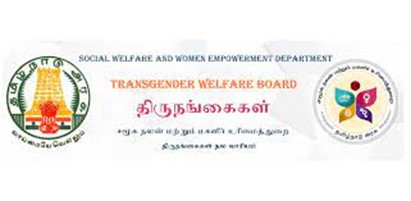
- The judgement further directed the TNUSRB to include transgender people as a "third category", apart from the usual category of "male" and "female".
- On 22 April 2019, the Madras High Court Justice G.R. Swaminathan issued a landmark judgment upholding the marriage rights of transgender women under the Hindu Marriage Act, 1955.
- In august 2020, the Ministry of Social Justice and Empowerment appointed Gopi Shankar Madurai as the South Regional representative in the National Council for Transgender Persons.
Intersex rights
- On 22 April 2019, the Madurai bench of the Madras High Court passed a verdict to ban sex-selective surgeries on intersex infants.
- Based on the works of Gopi Shankar Madurai, the Court took note of the rampant practice of compulsory medical interventions performed on intersex infants and children.
- The Court also expressed its gratitude to Shankar, noting that Shankar's work has had been a "humbling and enlightening experience for the Court".
- In July 2019, Health Minister C. Vijayabaskar announced that guidelines complying with the court ruling and banning medical interventions on intersex infants would be drafted.
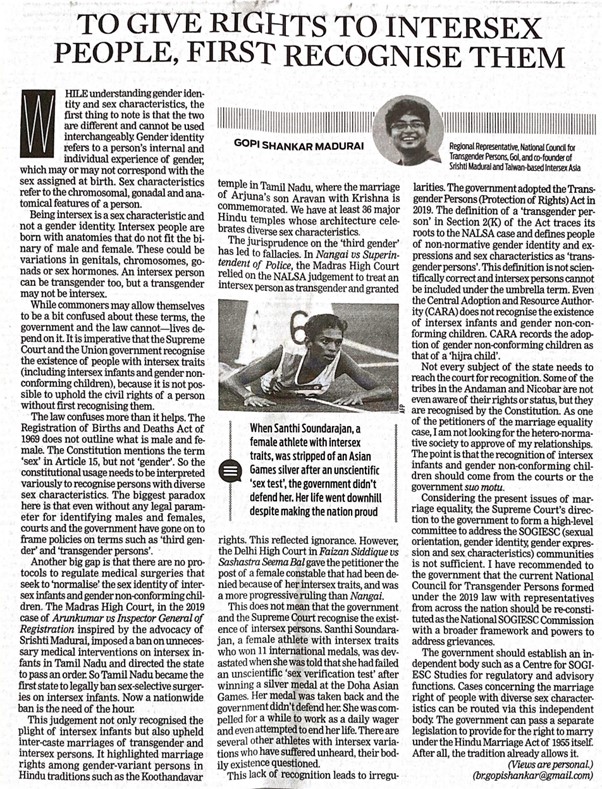
- On 13 August 2019, the Government of Tamil Nadu issued a government order to ban forced medical interventions on intersex infants.
- The Tamil Nadu government has issued a glossary, as suggested by the Madras High Court, as to how the persons belonging to the third gender should be addressed.
Who are LGBTQIA++
- The “L, G” and “B” refer to sexual orientation, meaning those to which one is attracted, most often referring to lesbian or gay.
- Bisexual is an attraction to both males and females.
- Transgender refers to one who identifies as a sex other than was named at birth.
- The Q indicates questioning and queer.
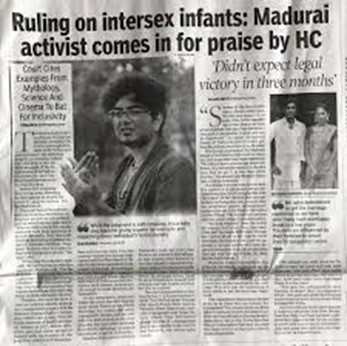
- Questioning is a label one might use to convey they are exploring their identity and may not want to label themselves.
- While Queer is often used to identify oneself as a member of the LGBTQIA++ community.
- The “I” speaks to intersex in which a person is born with a reproductive or sexual anatomy that doesn’t seem to fit the typical definitions of female or male.
- ‘A’ refers to asexual who do not have sexual feelings.
- ‘++’ suggests openness and inclusivity.
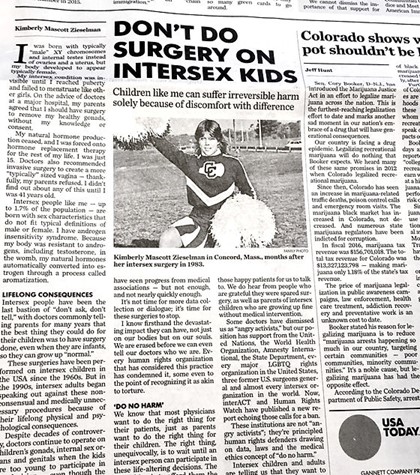
-------------------------------------
Leave a Reply
Your Comment is awaiting moderation.


